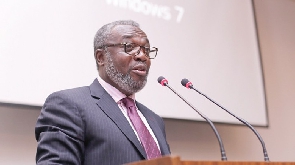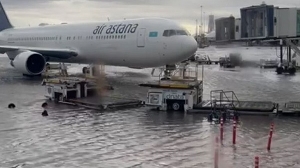Health News of Tuesday, 7 May 2019
Source: myxyzonline.com
GHS, MoH failed in new malaria vaccines education – Dr Bernakuu
President of the coalition of NGOs in Health, Dr. Gabriel Bernaku has underscored the need for Ghanaians to happily embrace the new malaria vaccines being implemented by the Ministry of Health (MoH) and the Ghana Health Service (GHS) as a means to curb malaria in children in the country.
His comments come after rumours went viral on social media that the vaccines were yet to be tried in the three countries and therefore sought to discourage parents to embrace the progrmme.
Speaking on Dwaboase on Power 97.9 FM on Monday, Dr. Bernaku told with Kaakyire Kwasi Apea-Apraku said the trial was done ten years ago at Kintampo, Agogo and some other areas in the country as has been communicated by the GHS.
Dr. Bernaku also noted the exercise will help protect over six million children in the country from malaria yearly, adding that it is a beneficial venture for the country.
However, he bemoaned the woeful and inadequate education on the vaccines; blaming the Ghana Health Service and Ministry of Health for the development.
“What we know is that we have followed this for over ten years and I can say the trial of the vaccines is over. So if it is really true the conversation is about the vaccines, then it is a beneficial venture for Ghana. The truth is, yearly, six million children are delivered and it is the responsibility of the government to protect the children so the introduction of the vaccines is in order,” he stated.
He added, “it appears we are the ones taking over the work of Ghana Health Service and the Ministry of Health educating the public on it which is not our work.”
About the vaccines
The Malaria Vaccine Implementation Programme (MVIP) to control malaria in the country is the first in the world. The programme is being piloted in Ghana, Kenya and Malawi to further assess its compatibility with other immunization programmes in the three countries.
According to the MoH, Ghana applied to be part of the implementation phase and was selected together with the two countries (Kenya and Malawi) I to implement the use of Malaria vaccines as part of Ghana Health Service’s (GHS) routine vaccinations for children between 6 months to 2 years.
Ghana was selected among the number of countries that applied because of the country’s robust Expanded Immunization Programme (EPI), well organized National Malaria Control Programme, Malaria burden, organized Health Systems, etc.
The Malaria Vaccine Implementation Programme (MVIP) was launched at Cape Coast in the Central Region on April 30, 2019. The pilot implementation started on May 1, 2019.
The MVIP will take place in 33 districts in 6 selected regions (Central, Volta, Oti, Bono, Bono East and Ahafo).
“The selected districts and regions were chosen through strict scientific method/criteria, using the burden of malaria, the state of immunization, other existing interventions, etc,” the GHS said in a statement last month and added, “Upper East will be used for the post-market survey.”
The vaccination is for children from 6 months to 2 years. It’s 4 dose injections at 6, 7, 9 months and 2 years. It will be part of GHS routine vaccinations and free like any other vaccinations.
The vaccine, according to the GHS, has gone through all the necessary quality controls and tests from its inception till date and registered with FDA.
All the necessary measures have been put in place and the required legal and other requirements had been sought to implement the Programme.
All stakeholders had been engaged and will continue to be engaged throughout, according to the GHS.
Health professionals for the implementation had gone through the necessary training and logistics for the takeoff are ready for smooth implementation. The implementation shall be done under strict monitoring.
GHS has assured it will continue to collaborate with other MDAs to make Ghana a Malaria-free country.











